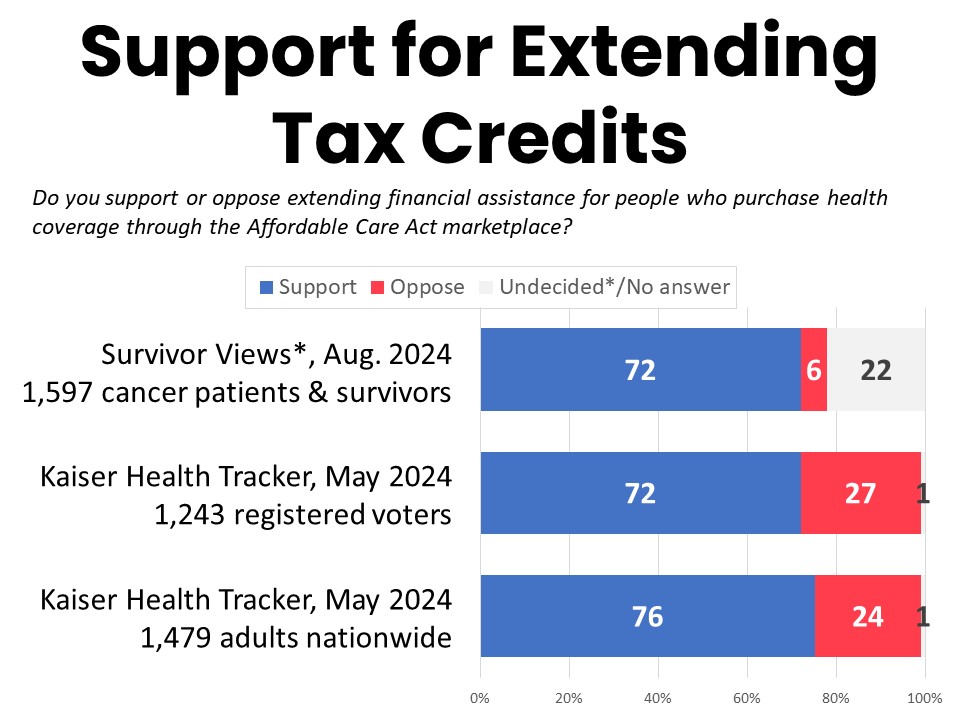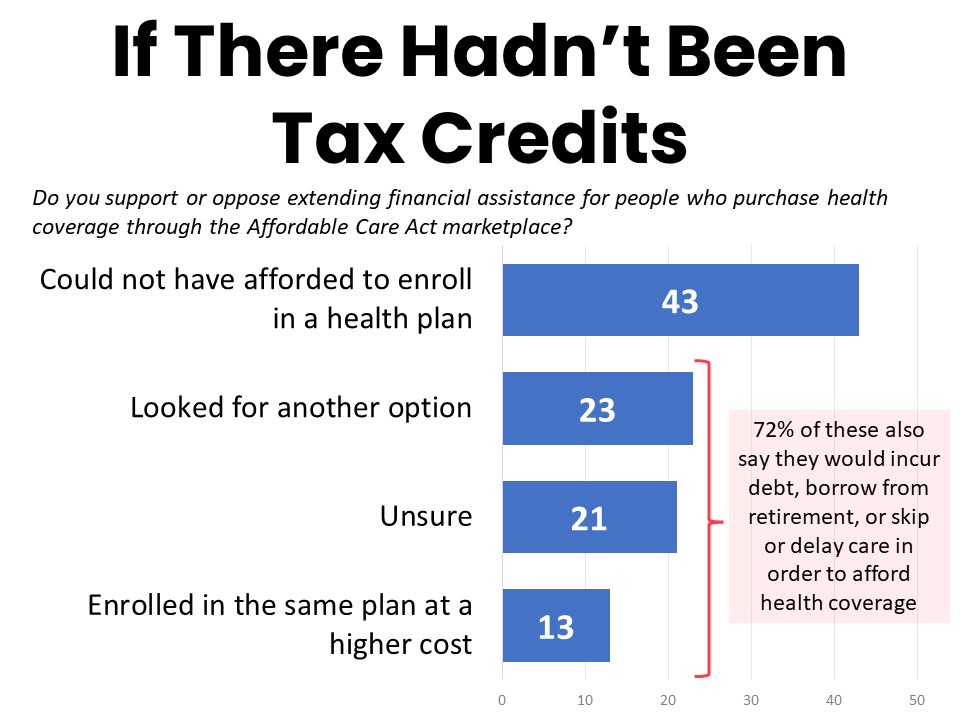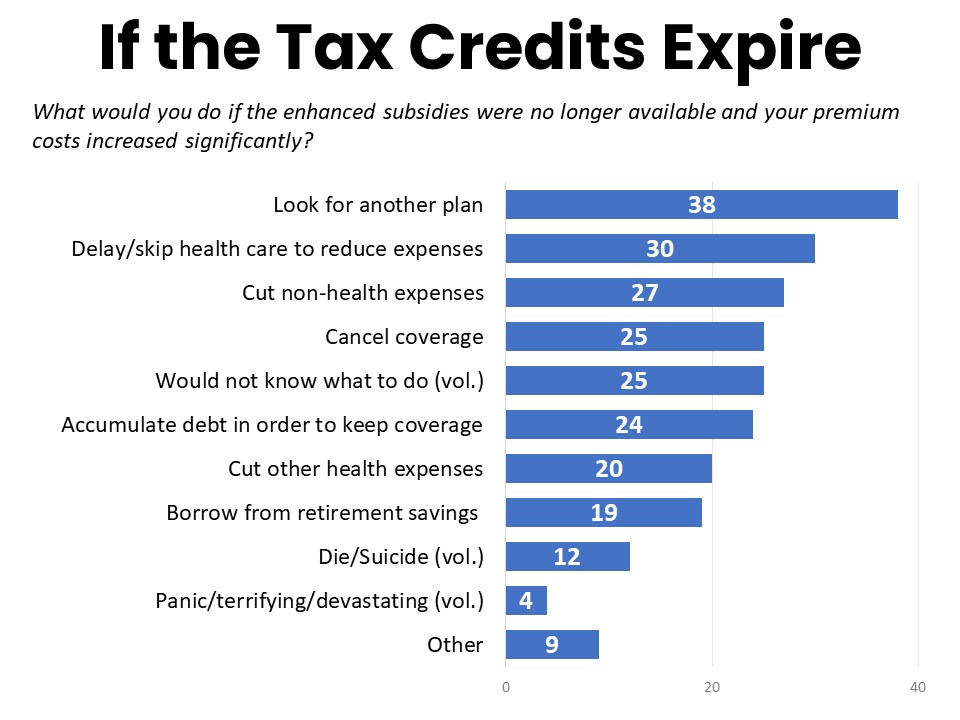Overview
The American Cancer Society Cancer Action Network (ACS CAN) empowers advocates across the country to make their voices heard and influence evidence-based public policy change, as well as legislative and regulatory solutions that will reduce the cancer burden. As part of this effort, ACS CAN deploys surveys to better understand cancer patient and survivor experiences and perspectives, through our Survivor Views research panel. The panel is a group of cancer patients and survivors who respond to regular surveys and provide important insights to support ACS CAN’s advocacy work at all levels of government.
This survey explores the impacts of Affordable Care Act (ACA) enhanced tax credits on cancer patients and survivors. The web-based survey was conducted among 1,597n cancer patients and survivors nationwide who have been diagnosed with or treated for cancer in the last seven years, including 269n who have been enrolled in a marketplace plan and 135n who recall having benefitted from subsidies.
Key Findings
- Cancer patients and survivors overwhelmingly support extending enhanced financial assistance for people who purchase health coverage through the Affordable Care Act marketplace, 72% support , just 6% oppose.
- Forty-three percent of those receiving the enhanced tax credits say they could not have afforded to enroll in a health plan without the tax credits. Others mentioned options which could lead to insufficient coverage or financial toxicity.
- If the enhanced tax subsidies expire:
- 30% say they would delay or skip medical care to reduce expenses
- 25% would cancel their coverage
- 24% would incur debt in order to keep their coverage
Detailed Survey Findings
Cancer Patients and Survivors Overwhelmingly Support Extended Tax Credits
Seventy-two percent of cancer patients and survivors surveyed support extending enhanced financial assistance for people who purchase coverage from the Affordable Care Act marketplace, while only 6% oppose. This mirrors data collected by KFF’s Health Tracking Poll which asked the same question in April-May 2024, and also found 72% of registered voters support extending the assistance. Furthermore, a recent ACS CAN Cancer Votes survey found even greater support among registered voters (78%) for making the enhanced tax credits permanent.

Plurality Wouldn’t Have Been Able to Enroll in a Plan Without Enhanced Tax Credits
When asked what they would have done if the enhanced tax credit hadn’t been available, 43% reported they wouldn’t have been able to afford to enroll in a health plan at all. Another 23% said they would have looked for other options, but for many seeking a coverage option more affordable than a marketplace plan the alternative could be catastrophic coverage offering lower premiums with very high deductibles or a “junk” plan offering insufficient coverage. Twenty-one percent said they weren’t sure what they would have done without the tax credits. While 13% said they would have enrolled in the plan at a higher cost, many of those also report trade-offs such as incurring debt, borrowing from their retirement savings, or skipping or delaying medical care. All of these outcomes could have serious consequences for cancer patients, from inadequate treatment to financial toxicity.

Cancer Patients and Survivors Report Significant Impacts if the Enhanced Tax Credits Expire
Cancer patients and survivors anticipate a number of negative impacts if the enhanced tax credits were no longer available after they expire in 2025. Unable to afford their plan without the enhanced subsidies, 38% would look for another plan. Thirty percent said they would skip or delay health care to reduce their expenses, while 27% would cut other non-health expenses. Twenty-five percent would cancel their coverage and another 25% volunteered that they would not know what to do. Nearly a quarter (24%) say they would accumulate debt in order to keep their coverage, while 20% would cut other health expenses. Almost one-in-five (19%) said they would borrow from their retirement savings in order to afford their care. Twelve percent wrote in that they did not expect to survive their cancer without the subsidies since they would not be able to afford treatment.

Cancer Patients and Survivors Speak Out on Impacts of Tax Credits Expiring
In open-ended comments, cancer patients and survivors describe how it would impact them if the enhanced tax credits expire at the end of 2025. Their individual stories include facing deepening debt, trade-offs between paying for their care and being able to afford healthy food or a home, and being able to receive life-saving care. Representative quotes include:
“The lack of tax credit would result in me looking for a much higher deductible and copay to make the monthly affordable. And then I would be unable to pay that higher deductible and copay, so bankruptcy I suppose.”
“I would have to make many sacrifices such as cash advance, payday loans and possibly working several jobs to ensure I could afford my health care needs.”
“I could have lost my home without the tax credit. Or gone without needed medical treatment.”
“The tax credit helps keep health insurance affordable. I would have to pay close to $10,000 more a year for coverage if subsidies end.”
“I’m a cancer patient and my husband is a cancer patient also. We are in desperate need of these tax credits or we won’t be able to afford insurance premiums or get the care that we need.”
“It would impact my health if the premium tax credits were not available to me. I would still use self pay which would continue to increase out of pocket expenses. I already have about $10,000 of medical debt.”
“Our credit card debt would go up substantially. We would be charging to credit cards.”
“If there was no premium tax credit I would look for a catastrophic plan and put off medical care as much as possible.”
“We would probably be forced to sell our house or cash out our retirement plan.”
“My fight with cancer has already depleted savings and retirement options. If I did not have [the tax credits] I would not be able to get healthcare.”
“This is overwhelming to think about. I would be in dire need of help.”
Methodology
ACS CAN’s Survivor Views research initiative was designed to support the organization’s efforts to end suffering and death from cancer through public policy advocacy. Data provided by cancer patients and survivors as part of this project allows for a greater understanding of their experiences and opinions on cancer-related issues and gives voice to cancer patients and survivors in the shaping and advocating of public policies that help prevent, detect, and treat cancer and promote a more positive quality of life for those impacted.
To ensure the protection of all participants in this initiative, Survivor Views is administered under the Morehouse School of Medicine Institutional Review Board. The survey population is comprised of individuals who meet the following criteria:
- Diagnosed with and/or treated for cancer within the last seven years
- Over the age of 18 (parents of childhood cancer survivors were invited to participate on behalf of their minor children)
- Reside in the US or US territories
Survivor Views participants are invited to participate through email, direct mail, social media, and outreach to communities and partners engaged with cancer patients and survivors. Those who agree to participate after reviewing the informed consent information complete the survey online, including demographic and cancer history information to inform analysis and topical questions as discussed in this document. The data were collected between July 26-August 30, 2024. A total of 1,597 participants responded to the survey.
About ACS CAN
The American Cancer Society Cancer Action Network (ACS CAN) advocates for evidence-based public policies to reduce the cancer burden for everyone. We engage our volunteers across the country to make their voices heard by policymakers at every level of government. We believe everyone should have a fair and just opportunity to prevent, detect, treat, and survive cancer. Since 2001, as the American Cancer Society’s nonprofit, nonpartisan advocacy affiliate, ACS CAN has successfully advocated for billions of dollars in cancer research funding, expanded access to quality affordable health care, and advanced proven tobacco control measures. We stand with our volunteers, working to make cancer a top priority for policymakers in cities, states and our nation’s capital. Join the fight by visiting www.fightcancer.org.


